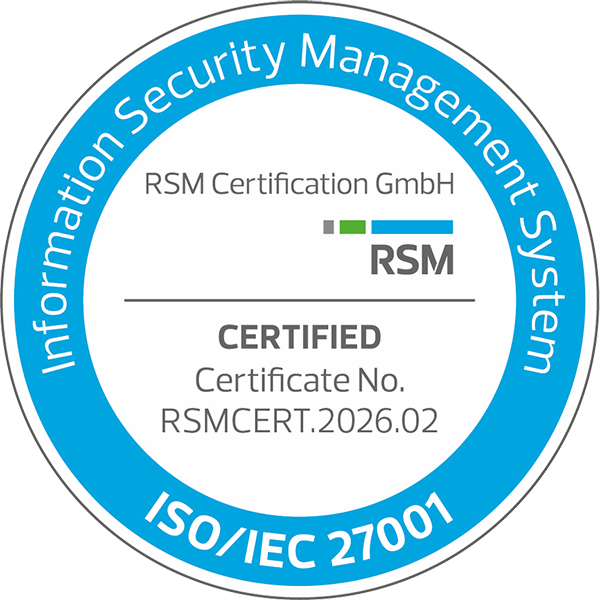vitafy
EASY Invoice at the leading e-commerce company in the food supplement sector

Founded in 2013, vitafy.de is today one of the leading online shops for dietary supplements in Germany. With three locations, 85 employees and a turnover of 50 million in 2019, vitafy has gone from a start-up to a grown-up in recent years.
The Digital Invoicing Process at vitafy
With three successful acquisitions in 2019 – the brands GymQueen, BodyLab and Lineavi – vitafy is clearly on a growth path. It started as a pure web store. Now, vitafy sells six own brands – online and through brick-and-mortar stores in Germany, Austria and Switzerland.
The acquisitions in 2019 are the first step for vitafy to develop into a kind of umbrella company for brands in the area of fitness, weight loss, nutritional supplements and functional food. Such rapid, complex growth is noticeable in all departments – which entails the finance department of vitafy as well. This was the reason why Andreas Reif, CFO at vitafy, decided to implement easy invoice in 2019.
Mr. Reif, you have been working with easy’s digital invoice receipt for a year now. What was the trigger for you to digitize your incoming invoice process?
Andreas Reif: Vitafy Brands Group has grown strongly – organically and inorganically – in recent years. For us, the goal of implementing the digital invoice process was to increase productivity and scalability through faster approval processes and more transparency – across all group companies. It is important to us not to simply shoulder the strong growth of the company with more staff, but to scale with automated, digital processes and thus be able to handle more processes and transactions in the administrative areas every day with the existing staff.
We would not be able to maintain the approval processes for invoices, which are necessary from a legal and content point of view, if we did not have a digital invoice receipt and approval process.
Andreas Reif,
CFO bei der vitafy GmbH
founded
employees
mio. € revenue (2019)
PROJEcT INFORMATION
we must ensure that our employees are relieved of repetitive process tasks
Andreas Reif: In the first step, the challenge was to convince people to invest in a digital system. After all, the finance and controlling functions are “only” downstream, administrative areas in the company at first glance. Customer engagement and sales are generated in the front end, which is the main focus of software and development investments. In the end, the difficult recruiting environment in the accounting area and the possibility of a quick implementation were two of the factors that convinced us. In the beginning, we lacked the internal know-how on how to manage and support these finance IT and workflow systems in-house. We appointed a dedicated employee in our finance department who was responsible for project management, roll-out and in-life management. Due to the existing knowledge and experience on the part of HENRICHSEN4easy and their close cooperation, the implementation then ran as “training on the job” and the knowledge transfer worked very well right from the start.
Andreas Reif: It is only the digital invoice receipt and approval process that enables us to work completely remotely and from many locations at the same time in the first place – while ensuring full operational readiness and transparency in the processes. Quite honestly: If we didn’t have easy, we certainly wouldn’t have been able to send all employees in accounting, purchasing, and invoice verification to remote work 100 percent of the time. Maintaining invoice approval processes, which are required legally and in terms of content, would not be possible at all if we did not have a digital invoice receipt and approval process. The damage and frustration of not being able to review, post and pay invoices in a timely manner, and thus not being able to receive goods and products from suppliers and deliver them to our customers on time, is hard to estimate. This could even threaten the existence of companies.
Andreas Reif: We are currently in the process of implementing an ERP system to digitize merchandise management, logistics and order processes (purchase-to-pay), and also to integrate B2B sales processes (lead-to-cash). This will automate the entire invoice verification process (OCR readout of delivery quantities/article prices and reconciliation with purchase orders and goods receipt notifications) as far as possible. The goal is EDI capability and financial accounting that is as paperless as possible, moving towards RPA (Robotic Process Automation) in financial accounting. We also want to digitize our HR processes – from recruiting and onboarding to electronic employee files – in the future. Once you have experienced for yourself in your daily work how much faster, more transparent, scalable and efficient you can work with digital and automated processes, the added value for the company and the employees is obvious. Particularly – but not only – in the area of finance, digitization and automation are for me the top priority project that we must address in order to remain fit for the future, to have the most up-to-date financial data available quickly and efficiently at all times, to be able to operate optimal cash management, and to be able to attract the best employees to the company and develop together.
The success of a company does not lie in a backward view of the accounting system, but in the immediate analysis of the ACTUAL with the constant comparison of the preview/forecast or the striving for “how can we do things differently and better in the future”. Artificial intelligence and RPA will not replace the human ability to learn, analyze and interpret in the near future – but we must ensure that our employees are relieved of repetitive, almost standardized recording and process tasks so that they can focus 90 percent of their time on extracting decision-relevant information from the recorded financial data.
the right data in the right hands
